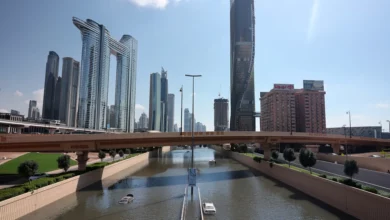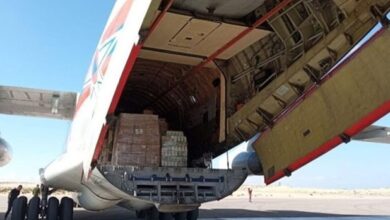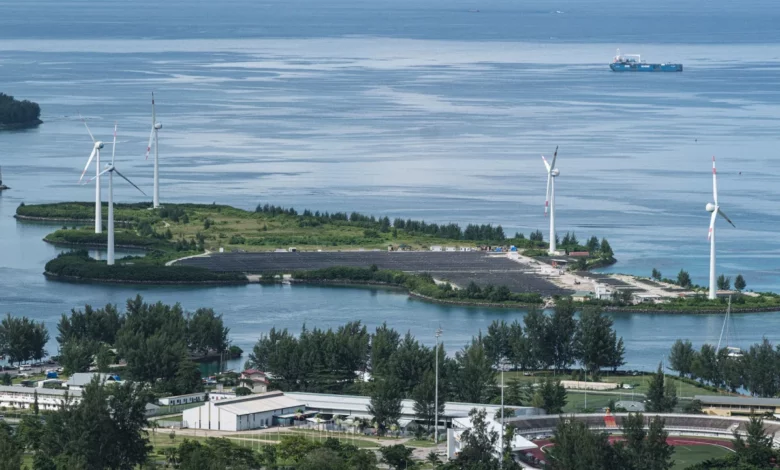
When the Seychelles government announced it would allow a Canadian company to explore for oil in its waters in September 2022, it said it hoped it would never have to extract the oil.
The small archipelago nation, off the eastern coast of Africa, is at threat from crushing sea level rise as the world continues to burn planet-warming fossil fuels. But long-promised finance from rich countries to help it make a green transition simply hasn’t arrived, President Wavel Ramkalawan told CNN in May. So they have had to look elsewhere.
“We’re hoping that whilst we do the exploration, all these promises will be fulfilled,” Ramkalawan said, meaning they could leave the oil in the ground. But, he added, “at the end of the day, it’s about survival.”
While not among the poorest developing countries, the Seychelles highlights a paradox faced by many in the Global South: How to grow their economies and cope with the expenses of climate-fueled disasters they did least to cause, while also responding to international pressure to stop burning fossil fuels.
It’s into this space that Sultan Al Jaber has stepped — the Emirati minister and businessman who will preside over the UN-backed COP28 climate talks in Dubai starting on November 30.
Al Jaber’s appointment as COP28’s leader has been met with fierce criticism among some media organizations, civil society groups and even politicians in the Global North. That’s because, while he serves as the UAE’s climate envoy and head of its renewables company, he also runs the state-owned Abu Dhabi National Oil Company (ADNOC). More than 100 members of the US Congress and the European Parliament in May called for him to be replaced as COP28 president-designate.
But Al Jaber’s decision to focus on increasing finance to help developing countries shift to renewable energy is helping his popularity in the Global South.
“The money must flow smoothly and fast to where it needs to go so that the Global South does not have to choose between climate action and development,” Al Jaber told delegates at a pre-COP opening ceremony in Dubai, in October.
For some leaders, this contrasts with a string of broken promises on finance from developed countries.
Countries in the West “promise and don’t deliver, but yet they tell you ‘you have to keep protecting the planet,’” Ramkalawan said. He said the UAE has funded wind and solar plants in the Seychelles, adding, “I think the commitment of the UAE speaks volumes.”
Under Al Jaber’s leadership at the pre-COP28 talks, countries reached an agreement on how to run a “loss and damage” fund that would provide some money to developing countries to pay for the outsized impacts of climate change they have experienced.
It was a welcome development for some after the rich world had for two years failed to deliver the annual $100 billion to developing nations that it agreed back in 2009. That money was supposed to reach the most climate-vulnerable countries by 2020 to help them tackle and adapt to the climate crisis. Even though the goal was finally reached in 2022, developing nations say it’s nowhere near enough.
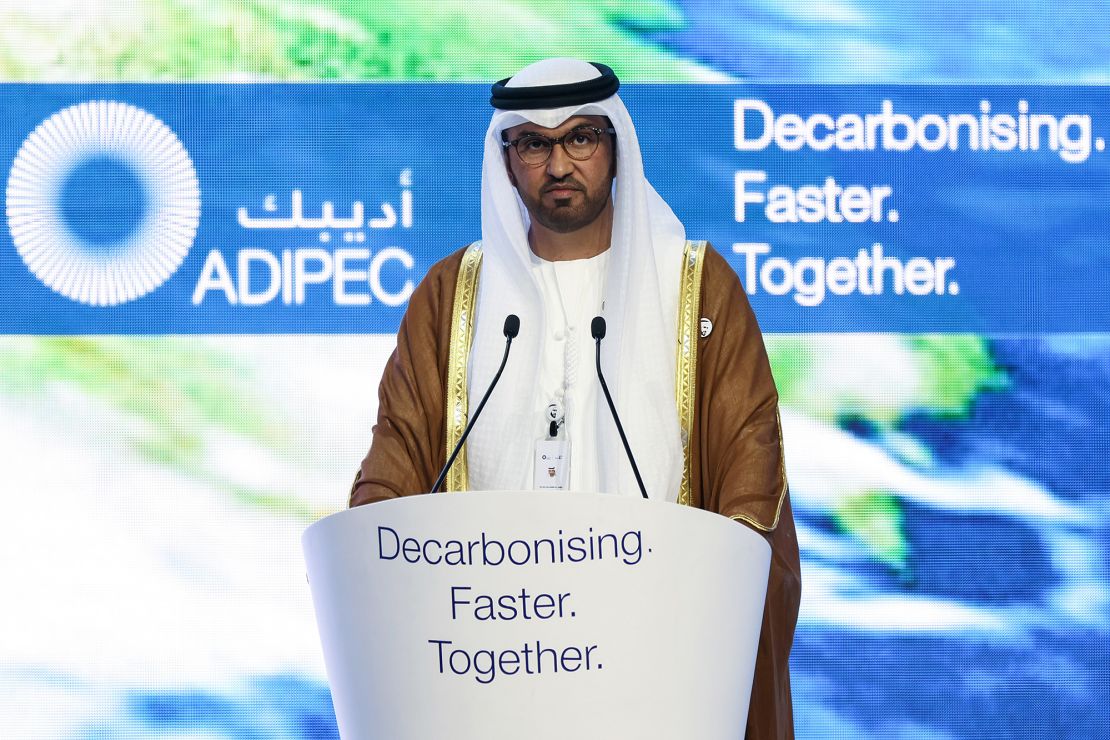
But many critics have cited the UAE’s plans to expand production of planet-heating fossil fuels as a conflict of interest in the COP28 talks.
ADNOC plans to invest $150 billion into scaling up its operations over the next five years. It is currently expanding its production capacity, aiming for 5 million barrels of oil a day by 2027, while the UAE government has said it plans to extract its very last barrel of oil 50 years from now, when its reserves are projected to dry up. That’s despite scientists saying society should be winding down oil and gas use now.
Al Jaber and ADNOC deny allegations of a conflict of interest, saying that having someone who knows both fossil fuels and renewables to lead the talks makes sense. ADNOC told CNN that there was “no one more qualified” than Al Jaber to lead the talks, pointing to his “20-year career across the renewable energy and conventional energy sectors” and his decade-long history in climate diplomacy.
Despite its plans to expand production, ADNOC previously told CNN that it was still aiming “to achieve net zero by 2045 backed by an initial $15 billion allocation.”
Struggling to keep up
Like the Seychelles, Kenya too is facing the challenge of how to cope with the expenses of climate-fueled disasters and rapidly scale up renewable energy without adequate funding.
When Kenyan President William Ruto, widely considered one of Africa’s leading climate champions, was asked if he was concerned about the oil-producing UAE hosting COP28, he told CNN he had no issue because the country is also among “the biggest investors in renewable energy.”
The UAE recently pledged $4.5 billion to finance clean energy projects across Africa. And in June, Masdar — the state-owned renewables firm founded by Al Jaber — was part of a group that signed a deal worth $10 billion to develop a 10GW wind farm in Egypt, billed as the biggest on the continent.
“We are spending inordinate resources to try and manage the effects of climate change,” Ruto said. He referred to Kenya’s catastrophic multi-year drought, which scientists found was made 100 times more likely by the burning of planet-heating fossil fuels.
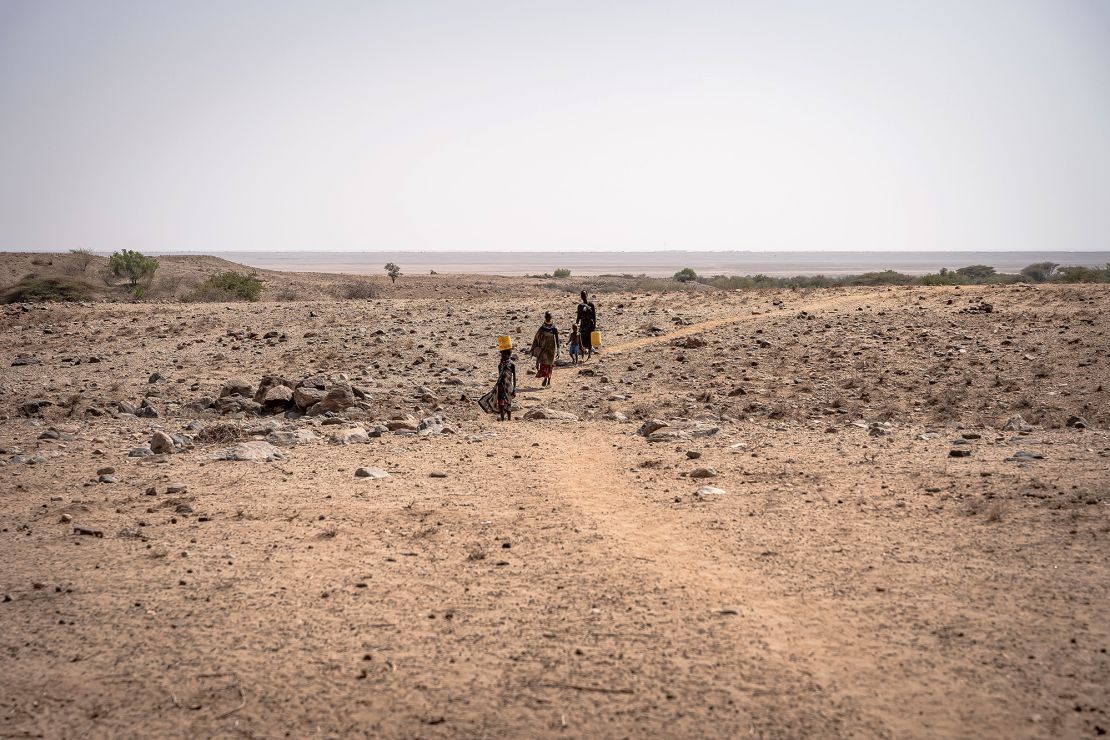
Even if the Global North has finally delivered the promised $100 billion of annual funding, it’s still a drop in the ocean compared to what some experts say is needed to help developing countries cope with the escalating impacts of the climate crisis and transform energy systems. A 2022 UN-backed report calculated developing countries will need about $2 trillion a year by 2030.
Harjeet Singh, the head of global political strategy for the Climate Action Network, said the reality is Western nations have not delivered. “We have seen the West only being extractive and very opportunistic, and actually kept developing countries dependent on fossil fuels,” he said.
Although he remained heavily critical of the UAE’s fossil fuel expansion plans, he told CNN that the country “has actually made some right noises in terms of offering investments in renewable energy, which seems promising.”
But others are more skeptical.
Sanim Vakil, the director of the Middle East North Africa Program at Chatham House, said ultimately, the UAE is looking to protect its interests in the energy transition.
“It needs to buy more time to diversify its economy further and wants to capitalize on its energy resources for as long as possible,” Vakil told CNN. “By positioning itself at the forefront of the conversation, the UAE helps preserve its own interests while seeming to champion those of the Global South.”
In a statement to CNN, a spokesperson for the COP28 team said “the challenge we all face is transitioning to a new energy system while keeping the lights on.”
The spokesperson said the COP28 team was committed to “ambitious, achievable, and substantial action,” which means, “holding back emissions, not progress, by ensuring energy security, accessibility, and affordability. Otherwise, we risk slowing down socio-economic progress and undermining support for ambitious climate action.”

